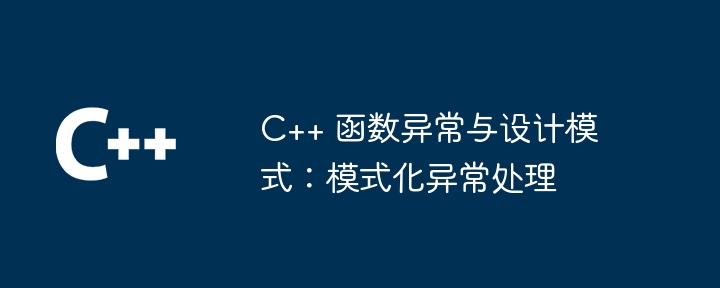
In C, exception handling design patterns are an effective way to create reusable and reliable code, including exception handling patterns. This article explores the following common patterns: Exception safety: ensuring that exceptions do not corrupt the internal state of a function. Accessor protection: Ensure that no exception is thrown when accessing member variables. Smart pointers: Automatically clear resources, even when exceptions occur. Exception delivery: allows exceptions to be passed from within a function to higher-level functions. Exception handling template: Provides a common mechanism to handle exceptions.

C Function Exceptions and Design Patterns: Patterned Exception Handling
Introduction
Exception handling is crucial in C because it provides a way to manage errors and inconsistent states. Design patterns help us create reusable, reliable code, including exception handling patterns. This article will explore common exception handling design patterns in C and provide practical cases to illustrate.
1. Exception safety:
Exception safety functions ensure that exceptions will not destroy the internal state of the function. This means that the function either handles the exception and recovers completely, or resets the state to its initial value before throwing the exception.
2. Accessor protection:
The accessor protection pattern ensures that no exception will be thrown when accessing member variables. It creates an accessor function with a preprocessor check that checks the validity of the member variable and throws an exception if it is invalid.
3. Smart pointers:
Smart pointers are C objects that manage memory and provide exception handling functions. If an exception occurs while releasing the resource held by the smart pointer, the smart pointer will automatically clear the resource.
4. Exception delivery:
Exception delivery mode allows exceptions to be passed from within a function to higher-level functions. It creates a wrapper function that catches the thrown exception and rethrows it to a higher level.
5. Exception handling template:
Exception handling template provides a general mechanism to handle exceptions. It is a template function that can be parameterized into multiple exception types and provides a unified error handling mechanism.
Practical case: accessor protection
Consider the following code snippet, which uses accessor protection in a function that accesses member_variable member variables:
class MyClass {
public:
int get_member_variable() const {
if (is_valid_member_variable()) {
return member_variable;
} else {
throw std::invalid_argument("Member variable is invalid");
}
}
private:
bool is_valid_member_variable() const { /* ... */ }
int member_variable;
};This accessor function will check whether member_variable is valid and throw an exception if it is invalid. This ensures that no unnecessary exceptions occur when accessing member_variable.
Conclusion
Exception handling patterns are crucial in C, they provide ways to manage exceptions and create robust, reliable code. This article explores common exception handling patterns and provides practical examples to illustrate them. By adopting these patterns, programmers can create safer, maintainable C code.
The above is the detailed content of C++ function exceptions and design patterns: patterned exception handling. For more information, please follow other related articles on the PHP Chinese website!
 What are the differences between c++ and c language
What are the differences between c++ and c language
 Recommended learning order for c++ and python
Recommended learning order for c++ and python
 Cost-effectiveness analysis of learning python and c++
Cost-effectiveness analysis of learning python and c++
 Is c language the same as c++?
Is c language the same as c++?
 Which is better to learn first, c language or c++?
Which is better to learn first, c language or c++?
 The difference and connection between c language and c++
The difference and connection between c language and c++
 C++ software Chinese change tutorial
C++ software Chinese change tutorial
 Cost-effectiveness analysis of learning python, java and c++
Cost-effectiveness analysis of learning python, java and c++




